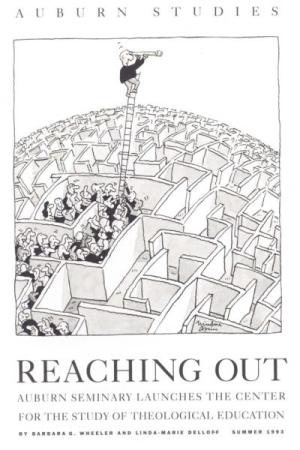Resources

The Center for the Study of Theological Education (CSTE) provides reliable information and perspectives on theological education in North America. It conducts a "cycle of surveys" that revisits segments of theological education--students, graduates, faculty, administrators, trustees, and seminary finances--regularly, in order to track trends over time. CSTE also studies special topics, such as student debt, doctoral education in theology and religion, and the culture of theological schools. Research results are available as issues of the occasional bulletin Auburn Studies or as special background reports. All reports are available on this site in PDF format.  Paper copies of recent reports are available by e-mailing: CSTE@AuburnSeminary.org. Some project results are also available in video format and more will appear in this form in the future. (From the Publisher)
Explores the correlation between religion and liberal education in the U.S. Influence of spiritual or religious practices on student learning; Effect of spirituality on liberal learning; Ways in which religious practices affect learning. INSET: MEASURES OF STUDENT ENGAGEMENT.
Results of the second phase in an ongoing major study of the spiritual lives of college students was released in a report called "The Spiritual Life of College Students." The study was conducted by the Higher Education Research Institute (HERI), a research center of higher education based in the Graduate School of Education & Information Studies (GSE&IS) at the University of California, Los Angeles (UCLA). It is a groundbreaking attempt to gain insight into the spiritual lives and concerns of students and improve how faculties and administrators at US colleges and universities address this part of their students' lives.
One of the most remarkable things about the human consciousness is that each of us has the capacity to observe our thoughts and feelings as they arise in our consciousness. Why shouldn?t cultivating this ability to observe one?s own mind in action,becoming more self aware or simply more "conscious" be one of the central purposes of education? Even a cursory look at our educational system makes it clear that the relative amount of attention that higher education devotes to the exterior and interior aspects of our lives has gotten way out of balance. Thus, while we are justifiably proud of our "outer" development in fields such as science, medicine, technology, and commerce, we have increasingly come to neglect our "inner" development the sphere of values and beliefs, emotional maturity, moral development, spirituality, and self understanding. This growing awareness of the importance of spirituality in higher education was recently underscored by the Templeton Foundation through its award of a $1.9 million grant to UCLA?s Higher Education Research Institute to support a large scale longitudinal study of spiritual development in college undergraduates. A pilot study of 3,700 students enrolled at forty-six colleges and universities was initiated in spring 2003, and a full-scale assessment of 90,000 students enrolling at 150 institutions will be initiated in fall 2004. Perhaps the most important thing to keep in mind about spirituality is that is touches directly on our sense of community. More than anything else, giving spirituality a central place in our institutions will serve to strengthen our sense of connectedness with each other, our students, and our institutions. This enrichment of our sense of community will not only go a long way toward overcoming the sense of fragmentation and alienation that so many of us now feel, but will also help our students to lead more meaningful lives as engaged citizens, loving partners and parents, and caring neighbors.
Part of a Pew Research Center series of reports exploring the behaviors, values and opinions of the teens and twenty-somethings that make up the Millennial Generation
Key Findings from the First National Longitudinal Study of Undergraduates' Spiritual Growth, conducted by the Higher Education Research Institute (HERI) at UCLA www.spirtuality.ucla.edu